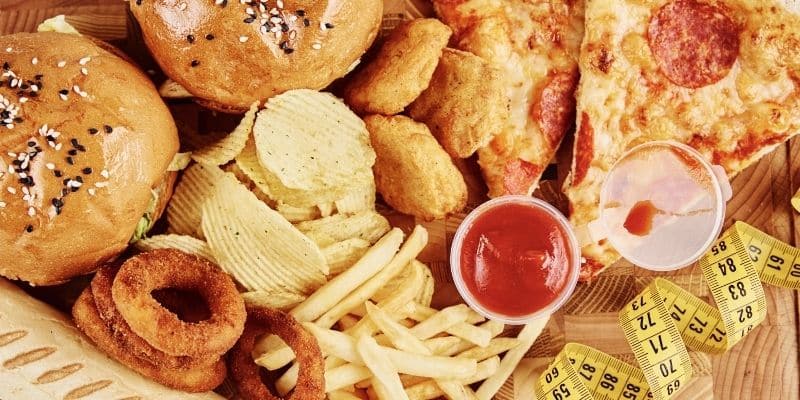Nutrition plays a pivotal role alongside training when embarking on a muscle-building journey. Among the macronutrients—proteins, fats, and carbohydrates—carbohydrates often spark debate regarding their necessity for muscle growth.
This blog will explore the importance of carbohydrates for muscle building, how they interact with protein, and practical guidelines for incorporating them into your diet effectively.
Table of Contents
- Understanding Carbohydrates and Their Role in Muscle Growth
- Why Carbs Matter for Muscle Building
- How Many Carbs Should You Eat to Build Muscle?
- Carb Timing for Muscle Gain
- Top Carb Sources for Maximum Muscle-Building Results
- The Science of Carbohydrates and Protein for Superior Muscle Gains
- Are Carbs Essential for Muscle Growth?
- Essential Fats for Bodybuilding
- Practical Guidelines for Incorporating Carbs into Your Diet
- Final Takeaway: Balancing Carbs with Protein
- FAQs
Understanding Carbohydrates and Their Role in Muscle Growth
Carbohydrates are essential for fueling your workouts and aiding recovery. They are the body’s primary energy source, especially during high-intensity exercise. When you consume carbohydrates, they are broken down into glucose, stored as glycogen in your muscles and liver. This glycogen is crucial for sustaining energy levels during workouts, making carbohydrates for muscle building an integral part of any fitness plan.
Why Carbs Matter for Muscle Building
Carbohydrates are essential for muscle building because they provide the energy needed for intense workouts. Your body relies on glycogen—stored carbohydrates in your muscles and liver—as its primary fuel source during high-intensity training. Insufficient carbohydrate intake can lead to fatigue and reduced performance, hindering muscle growth. Adequate carb intake also replenishes glycogen stores after exercise, ensuring optimal recovery.
Additionally, carbohydrates have a protein-sparing effect; when you consume enough carbs, your body is less likely to break down muscle protein for energy, allowing more protein to be used for repair and growth. Carbs stimulate insulin secretion, which helps transport amino acids into muscle cells, enhancing recovery and promoting muscle protein synthesis. This highlights the significance of carbohydrates for muscle building in supporting both performance and recovery.
How Many Carbs Should You Eat to Build Muscle?
Your carbohydrate needs are determined by body weight, activity level, and dietary goals. A general guideline suggests that carbohydrates should come from 45% to 65% of your total daily caloric intake. This range helps ensure adequate energy for workouts and recovery. Individual adjustments may be necessary based on personal preferences and fitness objectives. Monitoring your performance and energy levels can help fine-tune your carbohydrate intake for optimal results.
| Body Weight (lbs) | Daily Carb Intake (grams) | Daily Caloric Intake (approx.) |
| 150 | 225 – 375 | 2000 – 3000 |
| 180 | 270 – 450 | 2400 – 3600 |
| 200 | 300 – 500 | 2600 – 3900 |
This table roughly estimates carbohydrate needs based on body weight and caloric intake. Adjustments may be necessary based on individual goals and dietary preferences.
Carb Timing for Muscle Gain
The timing of carbohydrate consumption can significantly impact muscle growth and recovery. Here are some strategies:
Pre-Workout Carbs:
Consuming carbs before workouts can provide energy for intense training sessions. Aim for a meal or snack rich in complex carbohydrates about 1-2 hours before exercising.
Post-Workout Recovery:
It’s crucial to replenish glycogen stores quickly after exercising. A combination of protein and carbohydrates within 30 minutes post-workout maximizes recovery and muscle repair.
Throughout the Day:
Distributing carbohydrate intake evenly throughout the day can help maintain energy levels and support ongoing muscle recovery.
Top Carb Sources for Maximum Muscle-Building Results
Incorporating the right sources of carbohydrates for muscle building can make a huge difference in your training and recovery. Here are some of the best options:
Whole Grains:
Brown rice, quinoa, oats, and whole-grain bread provide sustained energy and essential nutrients.
Fruits:
Bananas, berries, and apples are great for quick energy and are rich in vitamins and minerals.
Vegetables:
Sweet potatoes, squash, and leafy greens offer fiber, vitamins, and long-lasting energy.
Legumes:
Lentils, chickpeas, and beans are high in both carbohydrates and protein, making them a versatile choice.
Dairy Products:
Milk and yogurt provide carbohydrates and protein, which are ideal for recovery meals or snacks.
These carbohydrate sources not only fuel your workouts but also aid recovery, ensuring that you make consistent progress in your muscle-building journey.
The Science of Carbohydrates and Protein for Superior Muscle Gains
Combining carbohydrates and protein is a powerful strategy for muscle building. Here’s why this pairing works so well:
Enhanced Recovery:
Carbohydrates replenish glycogen stores, while protein repairs muscle damage, ensuring quicker recovery after intense workouts.
Boosting Muscle Protein Synthesis:
Carbohydrates stimulate insulin, which helps transport amino acids (from protein) into muscle cells, promoting growth.
Sustained Energy:
Combining carbs with protein before a workout provides both immediate and long-lasting energy, optimizing performance.
For example, a post-workout meal of grilled chicken with quinoa and steamed vegetables or a protein shake with a banana can be highly effective. The synergy between carbohydrates and protein makes them indispensable for muscle building and overall fitness goals.
Are Carbs Essential for Muscle Growth?
Carbohydrates are essential for muscle building because they provide the energy needed for intense workouts. Your body relies on glycogen—stored carbohydrates in your muscles and liver—as its primary fuel source during high-intensity training. Insufficient carbohydrate intake can lead to fatigue and reduced performance, hindering muscle growth. Adequate carb intake also replenishes glycogen stores after exercise, ensuring optimal recovery.
Additionally, carbohydrates have a protein-sparing effect; when you consume enough carbs, your body is less likely to break down muscle protein for energy, allowing more protein to be used for repair and growth. Carbs stimulate insulin secretion, which helps transport amino acids into muscle cells, enhancing recovery and promoting muscle protein synthesis. Sufficient carbohydrate intake improves workout performance and supports more significant muscle gains, further proving the importance of carbohydrates for muscle building.
Essential Fats for Bodybuilding
Incorporating essential fats into your bodybuilding diet maximizes performance and recovery. Here are some key benefits of fats in your nutrition:
Energy Source:
Fats provide a calorie-dense energy source, offering nine calories per grais more than double the energy of carbohydrates and proteins. This makes fats particularly useful for sustaining longer workouts when glycogen stores are depleted.
Protein-Sparing Effect:
Adequate fat intake helps spare protein from being used as an energy source, allowing more protein to be utilized for muscle repair and growth. This is essential for maximizing muscle gains during training.
Hormone Production:
Healthy fats are crucial for producing hormones such as testosterone and insulin-like growth factor 1 (IGF-1), which play significant roles in muscle growth and maintenance.
Nutrient Absorption:
Fats are necessary to absorb fat-soluble vitamins (A, D, E, and K). These vitamins are essential for various bodily functions, including immune response and bone health, indirectly supporting muscle function.
Joint Health and Recovery:
Omega-3 fatty acids in fish oil can help reduce inflammation and joint pain, enhancing recovery after intense workouts. This can improve training longevity by decreasing the risk of injury.
Incorporating essential fats into your bodybuilding diet supports energy needs and enhances overall performance and recovery, complementing the benefits of carbohydrates for muscle building.
Practical Guidelines for Incorporating Carbs into Your Diet
To effectively incorporate carbohydrates for muscle building into your diet:
Choose Complex Carbohydrates:
Focus on whole grains (brown rice, quinoa), fruits, vegetables, and legumes that provide sustained energy and essential nutrients compared to simple sugars.
Monitor Your Intake:
Use food tracking apps or journals to monitor your carbohydrate intake and ensure you meet your daily needs based on your activity level and body weight.
Adjust Based on Activity Levels:
If you’re training harder or increasing workout intensity, consider adjusting your carbohydrate intake to support those demands.
Stay Hydrated:
Adequate hydration is essential when increasing carbohydrate intake as it helps with digestion and nutrient absorption.
Listen to Your Body:
Pay attention to how your body responds to different carbohydrate sources and adjust accordingly to optimize performance and recovery.
Final Takeaway: Balancing Carbs with Protein
In conclusion, while protein is crucial for building muscle, carbohydrates for muscle building also play an indispensable role in optimizing performance and recovery. By incorporating an appropriate amount of carbs into your diet, along with sufficient protein, you can enhance your ability to build muscle effectively.
Remember that individual needs may vary; listening to your body and adjusting your intake will yield the best results on your fitness journey. This blog provides an in-depth look at the necessity of carbohydrates for muscle building while offering practical advice on effectively incorporating them into a balanced diet.
FAQs
Do I need carbs if I’m trying to lose weight?
While reducing carbs can be effective for weight loss, they still play an essential role in maintaining energy levels during workouts. Choosing complex carbs in moderation can support both fat loss and muscle maintenance.
Can I build muscle on a low-carb diet?
Building muscle on a low-carb diet is challenging because carbs provide the necessary energy and help prevent protein from being used as fuel. However, some individuals may still see results with careful planning and adequate protein intake.
What types of carbs should I eat?
Focus on complex carbohydrates such as whole grains (brown rice, quinoa), fruits, vegetables, and legumes. These provide sustained energy and essential nutrients compared to simple sugars.
How do I know if I’m eating enough carbs?
Monitor your energy levels during workouts; if you feel fatigued or unable to perform at your usual intensity, you may need more carbohydrates in your diet.
Should I avoid carbs after a specific time?
Avoiding carbs at night is unnecessary; instead, focus on daily intake. Eating balanced meals throughout the day will support energy levels and recovery.










